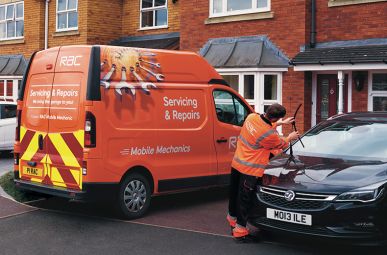Car battery life can be affected by a number of car maintenance issues and it's important to be aware of the warning signs if you want to avoid a vehicle breakdown,
This guide looks at how long a car battery will last before it needs replacing, and give you some tips to extend the life of your car battery and spotting signs of wear or weakness.
Are you experiencing a car fault, warning, or mechanical problem on your road trip? Find a local mechanic with the RAC.
What is a car battery?
A car battery is integral to all vehicles. It is the energy storage device that is used to power the electrical systems and start the engine. Most electric cars will use a 12-volt battery to power important systems.
Cars normally have lead-acid batteries, which consist of a plastic casing housing a series of lead plates submerged in an electrolyte solution. This is usually a mixture of sulfuric acid and water.
Other than starting the engine, it also powers various electrical systems in the vehicle, including lights, radio, air conditioning, power windows, entertainment systems, sat nav, and anything else that needs an electrical source.
The battery also allows the vehicle's electrical systems have a consistent power supply even when the engine or EV battery is not running. However, this can drain the battery if done repeatedly or over a long period of time.

RAC sale – up to 33% off*
• Roadside cover from £5.29 a month†
• We get to most breakdowns in 60 mins or less
• Our patrols fix 4/5 breakdowns on the spot

How long do car batteries last?
Although the lifespan of your car battery can vary depending on several factors, they generally last between three and six years.
Battery life can contrast drastically due a variety of factors. This can include the type of battery in the vehicle, typical driving conditions, maintenance practices, and climate the car is driven and stored in.
Poor vehicle maintenance can reduce battery life. Leaving electrical items switched on when the engine is switched off can also drain the battery, which is why it is always important to ensure you switch off the interior and exterior lights when exiting the vehicle.
Car batteries can also be damaged when they are jump started incorrectly or fitted to the wrong type of vehicle. That is why it's important to seek advice from a trusted mechanic if you experience a battery fault or are unsure which type of battery your car needs.
What issues do you get with car batteries?
Over the lifetime of your vehicle, it is likely that you will need to replace your car battery.
All car batteries gradually lose their capacity to hold and deliver a sufficient charge over time – which will impact many different parts of the vehicle, and increase the risk of an accident or a breakdown.
However, there are other common faults that you should be aware of. If you are unsure on what to do, visit your trusted local garage or call a mobile mechanic.
Sometimes it can just be caused by cold weather. Lower temperatures and wintery conditions can significantly reduce a battery's capacity to deliver power to the rest of the vehicle.
Similarly, heat can accelerate the chemical reactions within the battery, leading to faster degradation of the battery.
If your car is left unused for an extended period of time, then the battery can become drained – meaning that the engine won’t start.
Another common issue, especially in older vehicles, is corrosion. It can build up on the battery terminals, which are the connection points for electrical cables. This can lead to many problems, which will need to be resolved by a mechanic.
Damaged alternators and wiring can also lead to issues. Although you can fix these yourself, if you aren’t completely confident, visit your local garage.
A similar issue in lead-acid batteries is the build-up of sulphate crystals on the car battery plates. This can reduce the battery's energy capacity and its ability to hold a charge.
Finally, there may just be wear and tear over the period of owning the vehicle – or even damage caused by a collision or accident.
What is parasitic battery discharge?
Parasitic battery discharge occurs when a vehicle's battery loses its charge over time – even when the vehicle is not in use.
This happens when a continuous draw of electrical current continues after the engine or EV power supply has been turned off.
It is normally caused by faulty or broken components, and sometimes is caused by software issues from the onboard computer.
Can jump starting damage your car battery?
While jump starting is generally safe for both the car owner and the battery, there are a few potential risks to be aware of.
If the jump starting process isn't done correctly, it's possible for electrical surges to occur, which can damage the car’s electronics and battery.
Also, repeated jump starts or improper jump starting procedures can potentially damage the batteries over time – leading to an owner needing to replace the battery.
How can you extend the life of your car battery?
Despite the fact that the average life of a car battery can vary wildly depending on a variety of reasons, there are some simple ways to extend the life of the battery.
Your driving style can impact many things in your vehicle, including the car battery.
Frequent short trips and stop-and-go driving can put more strain on the battery, as the alternator might not have sufficient time to fully recharge the battery between starts.
Simple regular car maintenance, such as cleaning the battery terminals, and getting it serviced at least once a year, can help extend the life of the battery.
Also, if the vehicle is frequently left unused for extended periods, the battery might drain and mean that it will likely need replacing if it is not connected to a battery conditioner or trickle charger. However, frequent short journeys will also cause this to happen. This is because it doesn’t allow your vehicle the time to charge.
However, no matter what the cause of the issue is, if you notice signs of a weak battery, take it to your local garage. If there is a persistent issue, then it will likely need replacing.
Service, repair or MOT?
You can trust the RAC with our local approved garages and NEW mobile mechanics.












